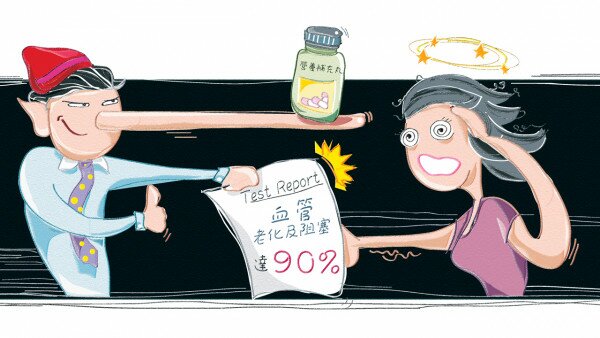Many consumers are health-conscious spending generously on health products, in the hope of maintaining good health. There sprang up free health talks and body checkups that, in reality, are meant to promote sales and entice purchase, targeting these consumers. Relevant complaints lodged with the Consumer Council indicate that some sales practices of health products, involving inaccurate or misleading descriptions of the products' efficacy, as well as results or analysis of body checkups, are problematic. Consumers need to be extra vigilant.
The Council reminds traders that sales malpractices, like providing exaggerated and misleading information about product efficacy could have violated the Trade Descriptions Ordinance. Before committing any purchase of health products, consumers should pause and think carefully. They should also be sceptical about the health analysis or claimed product efficacy presented by sales representatives. Consumers are advised to consult physicians or medical professionals when seeking remedies for any health concerns.
Case one: Shocking report analysis on-site deployed to push sales
The complainant made reservation for a free vascular-age test with Company A, as part of a credit-card promotion. After the test, the complainant was told that her arteries were aging and clots were developed blocking up to 90% of blood flow resulting in symptoms like dizziness. The complainant was persuaded to purchase Company A's nutrition supplement, purportedly effective in improving mental state and quality of sleep among middle-aged women after 3 to 6 months of use.
After hearing the test result and explanation, the complainant felt sufficiently alarmed that she consented to buy 6 bottles of the supplement capsules at a cost of $5,000, to safeguard her health. Later, the complainant, still concerned about the diagnosis, discussed her case with her family. She was fearful that her condition could lead to a stroke. She, then consulted a specialist, who took another test, which showed that the blood vessel, generally, was in a healthy state and there was no significant sign of problems. The complainant suspected that Company A's test result was inauthentic, and was displeased with the staff for implying there were threats to her health. She lodged a complaint with the Council. After intervention by the Council, Company A agreed to refund the price of the 5 bottles.
Case two: Free health talks and gifts to entice the elderly
Expensive health products was antioxidants in reality
Company B regularly organises free health talks and hands out free gifts especially for the elderly. The complainant attended these talks, occasionally, in the company of neighbours. At one talk held in October 2016, Company B, claimed that an antioxidant product could relieve pain and strengthen brain cells. The complainant, having suffered from bone pain, paid $2,000 for a bottle of capsules, following neighbours' recommendation and under the influence of herd mentality.
A few days later, after having carefully read the information on the package, the complainant's son discovered that the product contained only general gastroenterology ingredients which were incapable of treating the pain. The son believed that Company B's staff had misled his father and therefore requested a refund. Company B first indicated that they would only refund the unopened products. After multiple rounds of conciliation by the Council, Company B eventually made a full refund to the complainant.
Case three: Misguided by salespersons' unprofessional advice
Taking supplements casually may damage health
The complainant went passed Company C, where organic and health products were sold. After learning that the complainant's daughter was at the age of puberty, the salesperson strongly recommended a calcium supplement drink product, which she claimed could relieve stress and assist growth. The complainant bought a package set at $510. A few days later, when the complainant took her daughter for a routine medical check-up, she asked the doctor about the efficacy of the supplement products. The doctor responded that the supplement products contained calcium, magnesium and zinc, along with other ingredients which would not be suitable for all children. The doctor warned of possible side effects from excessive intake.
The complainant then argued with Company C's staff and requested a refund for the unopened bottle. Company C refused. The complainant then took the issue to the Council, stating that the staff had failed to recommend products appropriate to her daughter's age and health condition which had been made known to him, Company C disagreed with the complainant's allegation, and denied that the product was unsuitable for children. The company refused either a refund or exchange.
The Council reminds consumers that health products are not for treating illness, but only for use as supplements. They should always consult physicians or medical professionals when seeking treatment for an illness. When purchasing health products, consumers should obtain a clear understanding of product ingredients and efficacy, as well as their personal needs. When in doubt, they should seek professional advice, and avoid making hasty decisions. Otherwise, it could lead not only to wasting money, but could also delay treatment of conditions requiring professional medical attention. There are also risks of adverse effects or side effects from health supplements. Consumers should take heed the following tips:
- A great variety of health products is available at different retail outlets. There is no need to make purchase decision in haste. Discuss with family members and doctors, before making a choice suitable for your personal needs;
- When accepting a free medical checkup or other health services, especially when the services are provided by a trader, consumers should be extra wary of possible hidden sales agenda and judge with discretion;
- The ingredient of health products may not be suitable for everyone. Consumers should not choose recklessly. Stop using the products immediately if there is any adverse reaction;
- Consumers with chronic ailments, pregnant women and patients taking prescribed medicines should consult doctors and learn about possible side effects before consuming any health product.
The Consumer Council reserves all its right (including copyright) in respect of CHOICE magazine and Online CHOICE.




